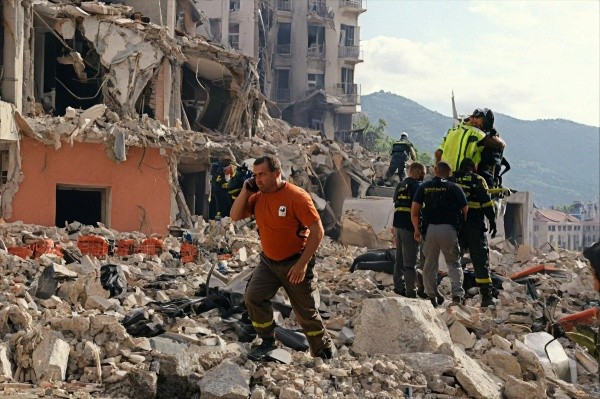Iran’s Plan to Strike Back Against the U.S.
Iran’s Military Preparations Following U.S. Attacks
Loading...

Tehran is not afraid of war but stands for a safe and stable Middle East, spokesperson Nasser Kanaani has said
Tehran's Stance on Regional Stability
In a significant announcement on Monday, Iran's Foreign Ministry declared that the country will not deploy military forces to Lebanon or Gaza to assist Hezbollah in its ongoing conflict with Israel. This statement comes as Israel intensifies its military operations against Hezbollah and other militant groups in the region, including the Houthis in Yemen. Nasser Kanaani, the spokesperson for the Foreign Ministry, emphasized that while Iran does not shy away from conflict, it prioritizes a safe and stable Middle East.
Kanaani stated during a weekly news conference, “There is no need to send extra or volunteer forces of the Islamic Republic of Iran.” He expressed confidence in the capabilities of Lebanese and Palestinian fighters to defend themselves against Israeli aggression. This assertion reflects Iran's broader strategy of supporting allied groups in the region without direct military involvement.
Escalating Conflict and Regional Implications
The backdrop to Iran's announcement is a marked escalation in hostilities, particularly from the Israeli Defense Forces (IDF), which have conducted extensive airstrikes in Lebanon. Reports indicate that these strikes have resulted in over 1,000 fatalities and more than 6,000 injuries among the Lebanese population, according to local health officials. The violence has also prompted a mass exodus from heavily bombarded areas, raising concerns about a humanitarian crisis.
Israel's military actions have included targeted strikes against senior Hezbollah commanders, reportedly killing many, including the group's leader, Hassan Nasrallah. This aggressive military posture has heightened fears that the conflict could spiral out of control, potentially drawing in Iran and the United States, Israel's primary ally.
Kanaani reassured reporters that Iran has not received any requests for military assistance from Hezbollah or other groups, asserting, “We are informed and are sure that they do not need the help of our forces.” This statement underscores Iran's position of supporting its allies through means other than direct military intervention.
Iran's Commitment to Accountability
Despite its decision not to deploy troops, Iran remains resolute in its commitment to hold Israel accountable for its actions. Kanaani warned that Israel “will not remain without reprimand and punishment for the crimes it has committed against the Iranian people, military personnel, and the resistance forces.” This rhetoric indicates that while Iran may not engage directly in the conflict, it is prepared to respond to perceived threats and aggressions against its interests and allies.
The Iranian government continues to express solidarity with Hezbollah, as evidenced by President Masoud Pezeshkian's visit to Hezbollah's office in Tehran to pay tribute to Nasrallah. This visit highlights the close ties between Iran and Hezbollah, reinforcing Iran's role as a key supporter of the group in its struggle against Israel.
Conclusion
As tensions in the Middle East escalate, Iran's decision not to send troops to Lebanon reflects a calculated approach to regional dynamics. By refraining from direct military involvement, Iran aims to maintain its influence while avoiding a broader conflict that could have devastating consequences. The situation remains fluid, and the international community watches closely as developments unfold, particularly regarding the potential for further escalation and the implications for regional stability.
Editor
Iran’s Military Preparations Following U.S. Attacks
Troops remain in five strategic locations, raising fears of renewed tensions and long-term occupation.
Opposition forces have taken control of the capital after a significant offensive. Here is how it unravelled.
